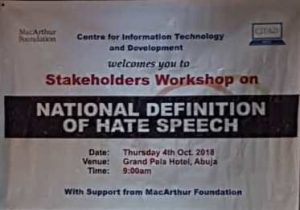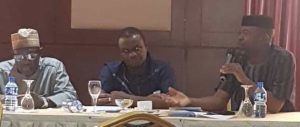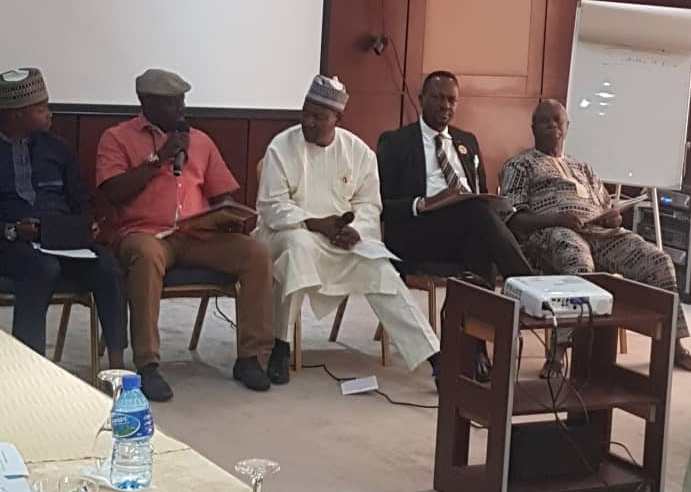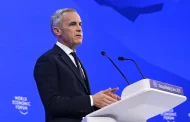 As politicians consciously and unconsciously caress violent ruptures in Nigeria by the reality they constitute through what they say, it is perhaps the most important thing to get to grips with such a thing as hate or dangerous speech. But what is it that we can say is hate speech. When is a speech hateful and by whom is that to be determined?
As politicians consciously and unconsciously caress violent ruptures in Nigeria by the reality they constitute through what they say, it is perhaps the most important thing to get to grips with such a thing as hate or dangerous speech. But what is it that we can say is hate speech. When is a speech hateful and by whom is that to be determined?
The first part of this report was on the ‘big’ grammar. This part will focus on the practical dimension of defining hate or dangerous speech even as the determination of what is hateful or dangerous lies completely in the sphere of interpretation. The trick CITAD adopted was to bring together all the key stakeholders: the academics who frame realty, civil society, media and the bureaucrats from such government departments as the Independent National Electoral Commission, (INEC); National Broadcasting Commission, (NBC) and the National Human Rights Commission, (NHRC) which is though not an institution of the Nigerian State but a product of the theory and practice of Orchestration in Global Governance. The panel of these stakeholders and practitioners was moderated by Prof Umaru Pate of the Department of Mass Communications, Bayero University, Kano.
It was back to brick walls in most cases. The moderator wanted to know what each panelist considered as hate or dangerous speech; who are major merchants of hate speech; whether the media can be acquitted or if gate keeping role can’t help journalists and journalism vis-a-vis hate speech control?; how far can the social responsibility theory help the media to confront hate speech? With these sort of questions as the discussion went on, the panel managed to produce definitions that will continue to undergo panel beating at different stages in future. But what might one take as representative views of the panelists on some of these questions?
Common to the panelists is the notion that a speech is hateful if it denigrates a group. If this is the case, why can’t journalists help out? Representative of the NUJ said journalism is about publishing the facts and it is driven by business logic. Another panelist from a think tank added a confirming view of the cold logic of profit based on his inference from previous encounters with media organisations such as the Nigerian Guild of Editors, (NGE), Advertising Practitioners Association of Nigeria, (APAN) and the Newspaper Proprietors Association, (NPAN). The first controversy began from here when the academic dismissed the notion of facts, saying that every fact or news is a carrier of values because “there is no neutral facts. Every news has ideology behind it. The task as he sees it is for the educational system to b e in a position to produce students who have perspectives, graduates who can interrogate things and ask for alternatives to received perceptions. In other words, the academic on this panel was sending a message to academics who are still teaching Mass Communication students that news is when a man bites a dog. Instead, news is discourse.

A line up of Mass Communication scholars at (L-R) ABU, Zaria; LASU and LASU who were part of the plenary
Second controversy was on how to define hate speech in way that did not injure freedom of speech. The NHRC panelist submitted that whatever definition of fundamental human rights still leaves the government of the day with responsibility to ensure national security. His argument is that “we need to qualify our definition of human rights in such a way that national and international security is guaranteed”. The question posed to him was: why essentialise individual human rights? Why not emphasise communal rights also?
There seemed to be consensus on who are the merchants of hate speeches. Everyone appeared to agree it is politicians and religious leaders, forcing the moderator to ask whether the media can be acquitted of hate speeches. The NUJ representative did not think the media could be fully acquitted but without failing to enumerate the constraints that drive media involvement in hate speech: the ownership and control factor, the social media reality, the role of technology. The question of who are victims of hate speeches enjoyed consensus too in that everyone agrees that it is the masses or the people who suffer its consequences. Why do those who make hateful speeches do it? The answer came in the view that it is for electoral cum political purposes.
The Chairman of the occasion decided that the audience should interrogate the panelists and it was a harvest of questions. Someone wanted to know what the NUJ is doing to deal with the media as accessory to hate speeches. Another wanted to know if it is hate speech when one political party takes another to the cleaners at a rally. A participant’s concern was with how journalists might balance between facts and hate speech and someone was concerned with the NUJ representative saying the union cannot control the social media.
One reply to the question of classifying a rally speech vis-a-vis hate speech is that it is the intention to action, the same criterion a judge uses to benchmark criminal liability. NUJ representative gave an answer that will make many happy on what the union is doing on making journalists hate speech compliant in reporting although he also attracted interrogation.

The broader stakeholders
There was a home truth of an intervention along the line. It is the view of the academic particularly on gate keeping which he describes as having become contested. Journalists should, in his view, stop deceiving themselves because the gate itself has been demolished by commercial/corporate considerations, technology and social media. There is no gate to keep anymore, not when there are m any television stations today acting as retainers to many state governments in Nigeria today. As he posed the question, how can they keep the gate with such packaged stories by pipers dictating the tunes?
His second point is the problematic of facts and national security. His view is that the society must exist before journalism can exist or be practiced. “If there are facts that can destroy the society, will you publish?” His answer is no because “your security is more important than the story”.
Similarly, he agrees with the NUJ representative that only the government, not the union, can control the social media. One way some other countries are going about this is to talk with those who control social media platforms such as Facebook, Twitter, etc to take down whatever is, by consensus, potentially destructive of a particular society.
His last point is an agreement with those who insist that the way out of hate/dangerous speech conundrum is to struggle for legitimate governments that are, to the extent of their legitimacy, capable of protecting the country. Democracy, he said, is by nature adversarial, full of contestations and, therefore, always in need of an umpire to reconcile divergent or hostile views by focusing on collective rights.
Closing the panel session, its moderator, Prof Pate agreed no less with the academic, saying that, in the case of facts, the social stability of the society must be privileged over and above every other consideration because once society scatters, every other thing, including journalism, is impossible.
There was still one last item on the agenda involving breaking into smaller groups to look at the context, situation analysis and attempts at definitions. It was from one of these groups that this definitional attempt came up:
“Any public statement or expression that promotes prejudice, intolerance and discrimination against a person or group of persons on the basis of religion, ethnicity, gender, sex, race, age and disability with an intention or call to violence or disruption of public peace or order” And here is another version:”Action or reaction targeted towards inciting hate and subsequently violent action or reactions towards a group of persons via images, writing, tag lines, verbal attacks, advertorials, depicting, disparaging, demeaning or hateful language”
Who says Nigeria is not on its way to a nationally acceptable definition of dangerous speech? After all, it is not a scientific matter because there can be no scientific definition of hate speech. Any definition acceptable to the stakeholders across the country can serve as a national definition. At the end of the day, it is the spirit rather than the letters of anti-hate speech that will save the nation from the perils of discordant tunes badly moderated!
*Pictures by Mariam Ado Haruna




























